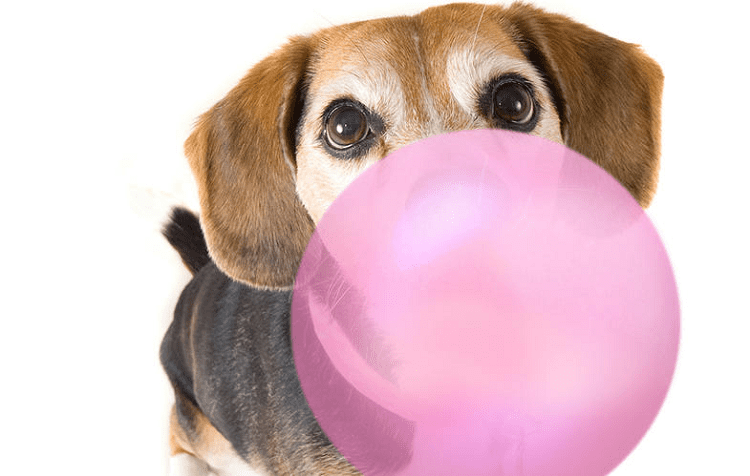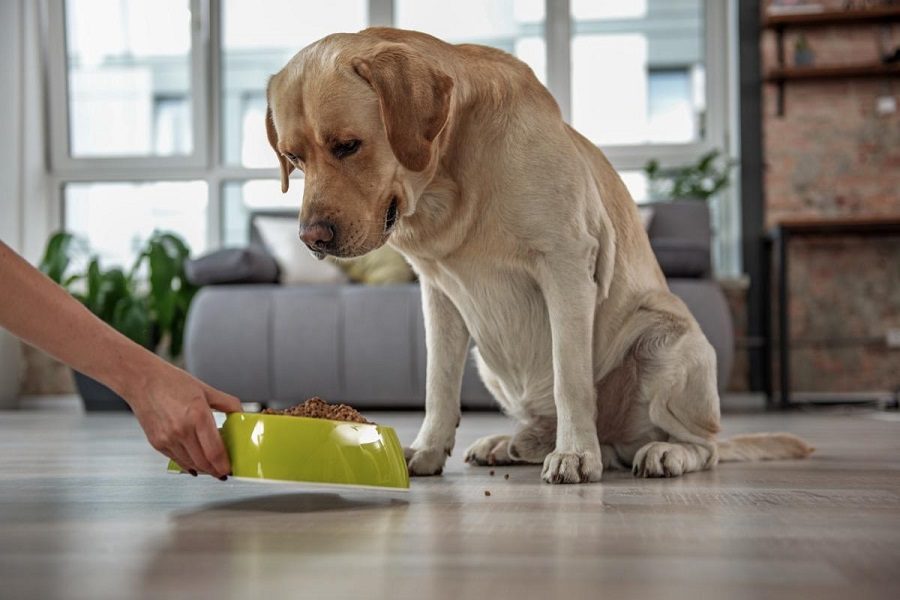Last Updated: 2 years ago
So you walk into the living room and see your dog looking guilty beside your spilled-out purse.
You notice your pack of gum is open and empty. You will probably start to panic. The only thought racing through your head is, “My dog ate gum, what should I do?”
Well, there’s good news and bad news. The good news is that if you chew normal gum with real sugar, your dog is going to be fine.
The only problem will be that the gum is going to take a long time to pass through your dog’s system. It’s going to be no worse than if you had swallowed the gum yourself.
It may cause a little bit of damage, but nothing serious and nothing that can’t heal on its own.
Sugar-Free Gum And Your Dog

Now, this is true if your dog ate gum that had real sugar in it. If you chew sugar-free gum, then you do need to be worried,, and you will need to take your dog to the vet immediately.
By immediately, I mean get your dog in the car now and finish reading this article while you are in the waiting room.
That’s the bad news. Sugar-free gum contains an ingredient called xylitol. This is an artificial sweetener that gum companies use to give their products a sweet flavor without having to use real sugar.
For humans, it is perfectly safe (otherwise they wouldn’t be allowed to put it in your gum), but dogs have different digestive systems than we do. A dog’s digestive system is not as well adapted to dealing with artificial foods.
When xylitol enters a dog’s system, it is immediately absorbed into its blood and triggers its body to release insulin.
Insulin is what processes the sugar in the blood. We have it, too, but our bodies can tell the difference between real sugar and xylitol, so it doesn’t get triggered when we eat it.
So what’s wrong with triggering insulin without sugar?
Your dog’s body starts to process the sugar it does have way too quickly, which leads to a sudden and serious drop in blood sugar levels.
Symptoms Of Xylitol Toxicity
The effects start to be noticeable about 10–15 minutes after your dog eats the xylitol gum. The symptoms include:
- Vomiting
- Loss of coordination
- Seizures
- Fainting
- Liver failure
- Internal bleeding
These are serious and can be deadly if they are not treated, so you need to take your dog to the vet as soon as possible.
The longer the xylitol stays in your dog’s system, the more severe the damage will be, and it may even kill them. So it is important to get your dog to the vet as soon as possible.
If you catch them immediately after they have eaten the xylitol gum, you have a very high chance of saving your dog.
Conclusion
Discovering that your dog ate gum can be a cause for concern, but taking the right steps promptly can make a significant difference. Dogs consuming gum, especially those containing xylitol, may face serious health risks.
Xylitol, a sugar substitute found in many sugar-free gums, can lead to insulin release, causing hypoglycemia (low blood sugar).
This can result in symptoms such as vomiting, loss of coordination, and even seizures. Immediate action is crucial. If you suspect your dog has ingested gum, check the ingredients for xylitol and contact your veterinarian right away.
Provide them with details on the gum’s ingredients, the amount consumed, and your dog’s current condition. Your vet may recommend inducing vomiting or other appropriate measures.
Monitoring your dog for signs of distress, such as lethargy, disorientation, or a loss of appetite, is important. Even if the gum doesn’t contain xylitol, large quantities can lead to intestinal blockages, posing another set of risks.
Prevention is key. Keep gum and other potentially harmful items out of your dog’s reach. Consider pet-proofing your home to create a safer environment. Regularly check for hazards and maintain open communication with your veterinarian.
By staying informed and acting swiftly, you can help ensure your dog’s health and well-being.
Resources:



